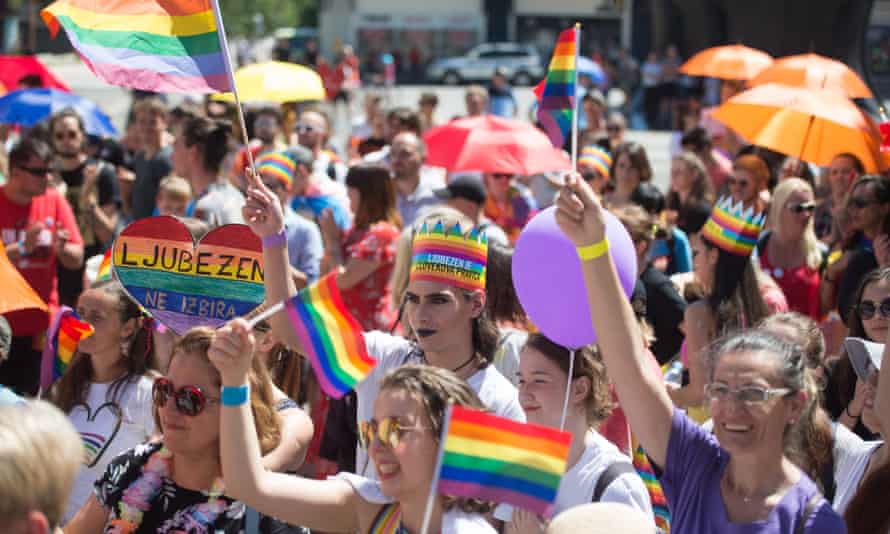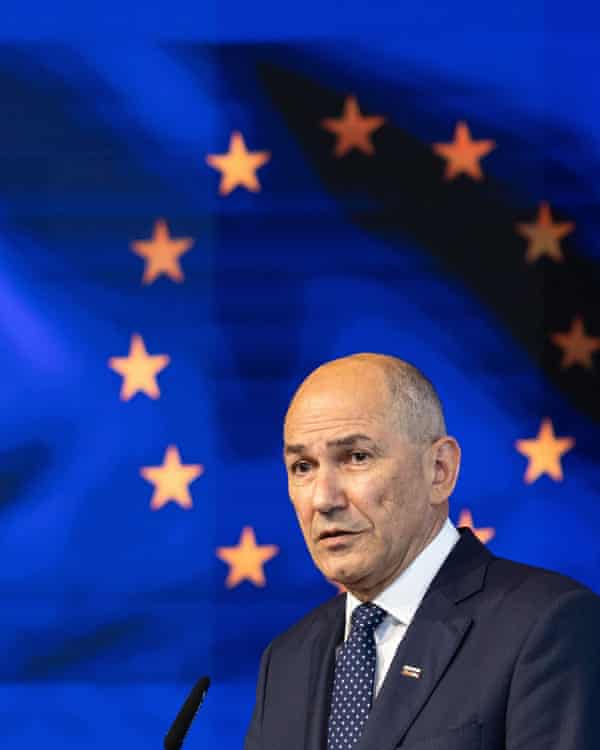Imposing ‘imaginary’ values risks EU collapse, Slovenian PM claims
As Slovenia takes over the EU presidency, its prime minister warns that the west cannot impose its liberal views on central Europe

First published on Sun 4 Jul 2021 10.15 BST
Slovenia’s prime minister Janez Janša, a rare EU ally of Hungary’s right to outlaw the promotion or portrayal of homosexuality to children, has claimed that imposing “imaginary European values” on central Europe could lead to the union’s collapse.
Janša, who publicly backed Donald Trump in his attempt to overthrow the US presidential election result, leads Slovenia as it takes the EU’s rolling presidency, steering the bloc’s agenda for the next six months. He is a deeply controversial figure, whose political career includes being jailed while battling for Slovenia’s independence from Yugoslavia and an overturned conviction for corruption.
The EU is facing daunting challenges as it seeks to rebuild out of a pandemic which badly damaged trust in its institutions, recalibrate its relationship with the US, prepare for the economic and political challenge posed by China and accustom itself to a starkly different relationship with its former member state, the United Kingdom. But speaking to a group of reporters from European newspapers, including the Observer, as Slovenia took over chairing the council by which member states help prioritise and form legislation, Janša drew on his experience of the Yugoslav federation when asked about the greatest risk to the EU.

A fortnight ago the Dutch prime minister Mark Rutte had led the charge against Hungary’s populist prime minister Viktor Orbán over a bill that will ban gay people from being shown in educational materials, on prime-time TV or in films and productions aimed at children. Rutte, who framed the clash as one of fundamental values, challenged Hungary’s leader to drop the law or take the country out of the EU.
But Janša said the imposition of an alien outlook by western member states was the “fastest road to collapse” of the bloc.
“There are differences that need to be taken into account and respected and I think there’s a clear division between national and European competences.
“You don’t judge a person based on imaginary European values, and dual standards are used, then I think this is the fastest road to collapse. Up to 30 years ago Slovenia lived in the former Yugoslavia and it was supposedly federal. There were five or six nations, three religions, six republics, two autonomous provinces and the country fell apart for different reasons but the last nail in the coffin was when some people started using special criteria for themselves, applying double standards.
“The EU without central Europe is not a European union – it will be just a shell and we should all be aware of it,” he said.
There are growing concerns in Brussels at the undermining of democratic norms in Slovenia. Janša has been accused of creating a climate of fear for journalists in his country, in part through his personal attacks on individuals through Twitter, earning him the nickname Marshal Tweeto, in reference to the former president of Yugoslavia, Josep Tito. The European commission has also appealed to the prime minister to stop withholding funds to the Slovenian press agency, a public service media outlet he has accused of “spreading lies”.
At a rocky launch of the presidency on Thursday, the European commission president Ursula von der Leyen had invited Janša to tell reporters gathered for a press conference when his government would appoint two officials to scrutinise the spending of billions of EU recovery funds.
Slovenia has failed to appoint prosecutors to the European public prosecutor’s office, which is tasked with challenging abuse of EU cash. It was confirmed last week that Slovenia will receive €2.5bn (£2.15bn) from an €800bn EU recovery and resilience fund. The European chief prosecutor, Laura Codruța Kövesi, has described Slovenia as a “huge risk” as a result.
Further souring the mood of the day, the commission’s vice-president, Frans Timmermans, had refused to join the traditional group photograph after Janša brandished a photograph of two Slovenian judges pictured with left-of-centre politicians to illustrate the bias of the country’s judiciary at a meeting with the 27 EU commissioners.
Janša brushed off the incident. “It wasn’t us that started the conversation and if you dislike the truth it is your problem, it is not a problem with the truth,” he said.
The 62-year-old instead argued that the newest members of the EU – Slovenia joined in 2004 – were being roughly treated by the commission: “We are not a colony – we are not second-class members of the EU,” he said. “We insist we need the same treatment… Yes, there are attempts that at least smaller countries in the EU are treated as second class. We exited the former country we were part of because we were treated as second class.”
While the Lisbon treaty enshrines human dignity, freedom, democracy, equality and the rule of law as fundamental rights, Janša claimed those critical of his own policies as well as that of Orbán and Poland’s rightwing prime minister Mateusz Morawiecki were seeking to impose a particular interpretation. Of a debate two weeks ago where Rutte had made his comments, Janša said: “There was no one opposing that all people are born equal, that we have equal rights. But there are certain distinctions when it comes to adoption of children, bringing up of children.”
Three years ago France’s president Emmanuel Macron had urged Europeans to defend their values by rejecting “illiberal democracy”, a vision of the EU that Janša said failed to recognise the different stages of economic and political development in the union.
“The fundamental difference is not between liberal and illiberal democracy,” Janša said. “The main difference is between democracy and technocracy and bureaucracy. So I believe the term used, illiberal democracy, was not the right one.”
“Because this concerns a division that does not exist: all shades of democracy, if I fight for the affection of my voters, in a free world, everyone is equal.”
During his two-hour briefing of
reporters, Janša insisted that he was being madly maligned by
“mainstream media”. He noted that there were few rightwing voices in the
Slovenian national media and showed a 10-minute video which he said
illustrated that it was the opposition parties guilty of undermining the
independence of the media. “The fundamental charter of human rights
also has the freedom of expression and the freedom of the media is
subordinate to that,” he said.




Nessun commento:
Posta un commento